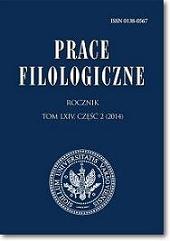Karla Bühlera semiotyczna teoria "origo" a (inter)subiektywne aspekty znaczenia. Spojrzenie kognitywne
Karl Bühler’s theory of origo and the (inter)subjective aspects of meaning: A cognitive view
Author(s): Henryk KardelaSubject(s): Language and Literature Studies
Published by: Wydział Polonistyki Uniwersytetu Warszawskiego
Keywords: Bühler; znak językowy; subiektyfikacja; intersubiektywność; bieżąca przestrzeń dyskursu; dzieło literackie; kulturowa perspektywa symboliczna; Bühler; linguistic sign; subjectification; intersubjectivity; current discourse space; literary work; symbolic
Summary/Abstract: Based on Karl Bühler’s two-field theory of language incorporating the concept of origo (i.e. a system of the “subjective coordinates” for orientation in time and space used by the speaker for organizing the personal, spatial and temporal structures of utterances), the paper attempts to reformulate Bühler’s theory in terms of the Langackerian notion of subjectification and the idea of intersubjectivity in the sense of Zlatev. It is claimed that the subjectification-based relation, which is held to obtain between the deictic and symbolic field of Bühler’s theory, can also be fruitfully used in the (inter)subjectificationbased accounts of narrative structure currently developed in the general framework of cognitive poetics as well as in the intersubjectivity-related symbolic theory of culture as developed by Tomasello.
Journal: Prace Filologiczne
- Issue Year: 64/2014
- Issue No: 2
- Page Range: 157-172
- Page Count: 16
- Language: Polish

